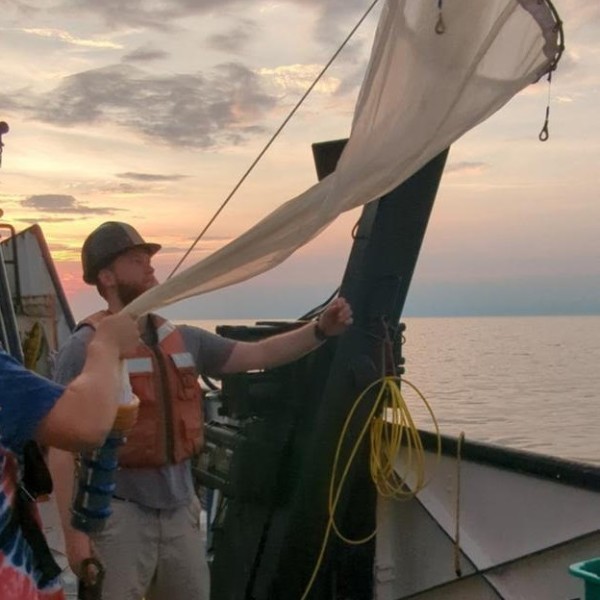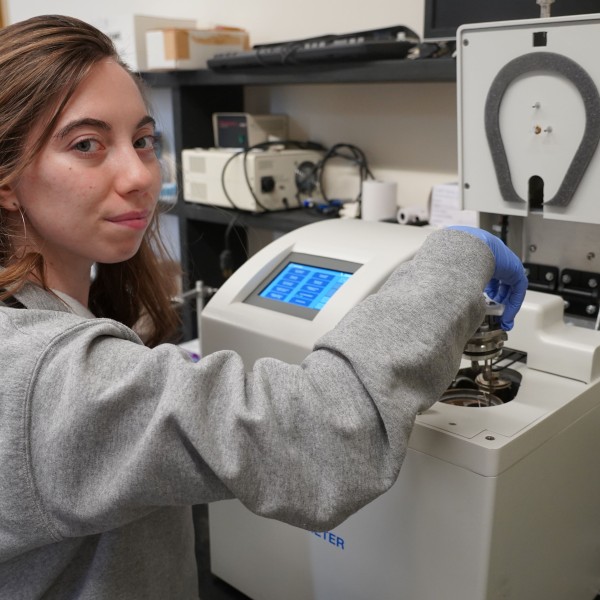Emerson Hall at Cornell CALS buzzed with anticipation as eager students and faculty gathered to gain valuable insights into the complex relationship between development and the environment. This enlightening presentation was delivered by four Humphrey Fellows: Ojok Okello (Uganda), Ruhsan Ozdemir Cifci (Turkey), Vanessa Hok (Suriname), and Hyomi Eom (South Korea). The conversation was moderated by Duku Emmanuel, another Humphrey Fellow from South Sudan. The fellows shed light on the sustainable development challenges in their respective countries, and demonstrated how various stakeholders, including the state, private sector, the local community, and NGOs innovatively find solutions to address this intricate conundrum.

Food loss and waste in Türkiye
Drawing from her experiences in Türkiye, Ruhsan Ozdemir Cifci, the Konak/Izmir District Director of Agriculture and Forestry, emphasized the pivotal role of the agricultural sector in the country. Türkiye holds the distinction of being both the largest agricultural economy in Europe and the seventh largest globally. The sector provides employment for almost 20% of the country's 85+ million population. Despite Türkiye's substantial investments in innovation and technology, which have mitigated the impact of climate change, the nation challenges food loss and waste. For instance, 18 million tons of food are lost and wasted in Türkiye each year. As Ruhsan pointed out, this phenomenon also contributes to environmental degradation. Food loss and waste not only demand additional water resources for increased food production but also lead to problems like the formation of sinkholes due to groundwater depletion, especially in Central Anatolia, notably the Konya District, a wheat production hub in Türkiye. Another challenge lies in the mismanagement of food waste, which often ends up in landfills.
However, Türkiye has already initiated significant policy measures to address some of these challenges. Notably, the 2021 Green Deal Action Plan outlines a commitment to reduce the use of pesticides, antimicrobial agents, and chemical fertilizers while promoting the adoption of organic alternatives. Furthermore, a substantial emphasis is placed on the integration of renewable energy sources within this plan. Türkiye is also transitioning from traditional sprinkler systems to more efficient smart drip irrigation methods. In the realm of reducing food wastage, the Ministry of Agriculture and Forestry in Türkiye has launched a large-scale "Save Your Food" awareness Campaign in collaboration with various stakeholders, including universities, NGOs, and with the main partnership of the FAO. These interactive and innovative campaigns, which target individuals across age groups and genders, have yielded impressive results, with two of them even achieving recognition in the Guinness World Records.

Protecting tribal lands in Suriname
Drawing on insights from Suriname, Vanessa Hok, a researcher at Tropenbos, a local NGO in the country, shared a case study centered on the Saamaka, a tribal community with a rich history of living in Suriname's rainforests for over two centuries. This community heavily relies on the forests for their livelihoods and predominantly engages in rain-fed shifting cultivation, primarily for subsistence, but this practice is facing adverse impacts due to climate change. Additionally, there has been a notable increase in gold mining activities in the region, with limited benefits accruing to the tribal communities.
In response to these challenges, Tropenbos, in collaboration with the Center for Agricultural Research in Suriname (CELOS), traditional authorities, and local residents, has been actively involved in initiatives aimed at enhancing agricultural practices. Notably, they have introduced agroforestry methods that integrate traditional knowledge with modern approaches. Furthermore, these organizations are assisting the tribal communities in forming agricultural cooperatives, facilitating access to financial resources, and strengthening their connections to the market.

Environmental justice and reparations in South Korea
Listening to Hyomi Eom, a senior environmental officer in South Korea, recount the nation's remarkable journey from poverty to economic prosperity while disregarding the environmental consequences was truly eye-opening. In pursuit of growth, South Korea made a significant shift away from agriculture and embraced a robust industrial policy that targeted key sectors such as heavy industry, shipbuilding, steel production, and petrochemicals. While this transition resulted in the creation of millions of well-paying jobs and the emergence of new industries and cities, it also led to a substantial increase in environmental costs. These costs included issues like air and water pollution, deforestation, and habitat destruction.
Just take a moment to imagine the environmental toll on a village like Geoggeodaeri, which saw the number of factories within its boundaries surge from a mere 11 to a staggering 517 in just four years. Think about the impact of the massive release of heavy metals such as nickel and lead into the air and soil in quantities that are difficult to quantify. It's hardly surprising that health problems, including a more than fivefold increase in lung cancer incidence among residents compared to the national average, have emerged.
However, the South Korean government can no longer turn a blind eye to these issues. In 2016, the country implemented a new law that provides a legal foundation and financial compensation to support the victims of these environmental challenges, with Hyomi's office actively engaged in this environmental justice initiative. To date, the office has acknowledged the suffering of 455 individuals and disbursed approximately $1.7 million in compensation. Beyond financial support, the Public Office of Environmental Protection also facilitates legal actions taken by local citizens against companies that contribute to environmental pollution. Moreover, Hyomi's office actively promotes environmental initiatives like strengthening pollutant discharge standards, the installation of pollution prevention facilities, and enhancing the environmental impact assessment systems.

Land restoration and innovative development in Uganda
Ojok Okello, the founder of the Okere City initiative, presented a compelling case from the remote northern Ugandan district of Otuke. This initiative aims to address the challenges faced by Okere City, a community located in a semi-arid region where the lives of its 10,000 rural residents hang in the balance. The severe and relentless impacts of climate change have resulted in a distressing 75% reduction in agricultural production. The situation is exacerbated by the fact that the village's rural population, reliant on natural rainfall for their crops, now grapples with food insecurity, with a staggering 70% of the population barely able to afford one meal a day.
In their struggle for survival, the local community resorted to cutting down shea trees to produce charcoal for quick cash. Regrettably, this practice led to an alarming 80% depletion of the shea tree cover between 2000 and 2020. Concurrently, the village's energetic youth are increasingly fleeing to nearby towns and distant cities in search of alternative livelihood opportunities, as the conditions in their hometown continue to grow increasingly harsh and challenging.
Amidst the challenging circumstances in Okere, are there any rays of hope piercing through the dark clouds? Absolutely! Through the unifying force of collective action, Okere City has managed to mobilize and facilitate the establishment of a shea butter cooperative society comprising 200 members. These individuals collect and enhance the value of shea butter, which has resulted in an increase in their daily household income, reaching $3 per day in 2022, up from just $1 in 2020.
In collaboration with local authorities, Okere City has successfully enacted bylaws to protect shea trees, mitigating their destruction. Coupled with extensive awareness campaigns, there has been a 95% tree loss reduction within just one year. Additionally, efforts are underway to replenish the shea tree population, with 2,000 new shea trees planted in 2023 alone. The long-term goal is to plant an additional 100,000 shea trees by 2030, fostering hope and sustainability in Okere's future. Furthermore, in their quest to enhance agricultural productivity, Okere City is actively advancing a community irrigation project. This initiative aims to provide 100 households with year-round access to fertile farmland, enabling them to complement their existing small-scale farming endeavors. Additionally, the small-scale farmers are undergoing training through extension services, equipping them with the knowledge and skills needed to embrace sustainable agro-ecological practices. To support various sustainable businesses in Okere City, which offer employment opportunities and essential services including education, healthcare, retail operations, community centers, and tourism, the project leverages solar energy. This showcases the potential for a shift to renewable energy as a cornerstone of sustainable rural development.
In addressing questions related to broadening stakeholder involvement and making the most of the fellowship's opportunities, the panelists highlighted their dedication to conducting independent research and dedicating time and resources to immerse themselves in the wealth of experiences and global examples available at Cornell. Additionally, the fellows expressed their intention to identify students and faculty members at Cornell who share an interest in collaborative endeavors, such as action research and other projects that align with their objectives.
Keep Exploring

News
- Biological Field Station
- Ashley School of Global Development and the Environment
- Natural Resources and the Environment Section

Field Note
- Animal Science
- Animals
- Climate Change

We openly share valuable knowledge.
Sign up for more insights, discoveries and solutions.


